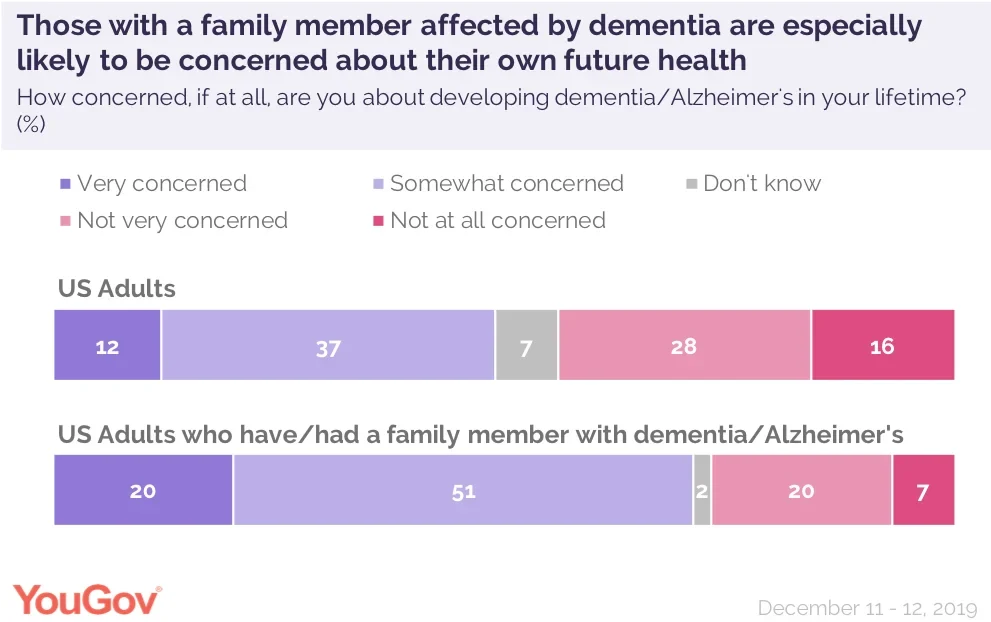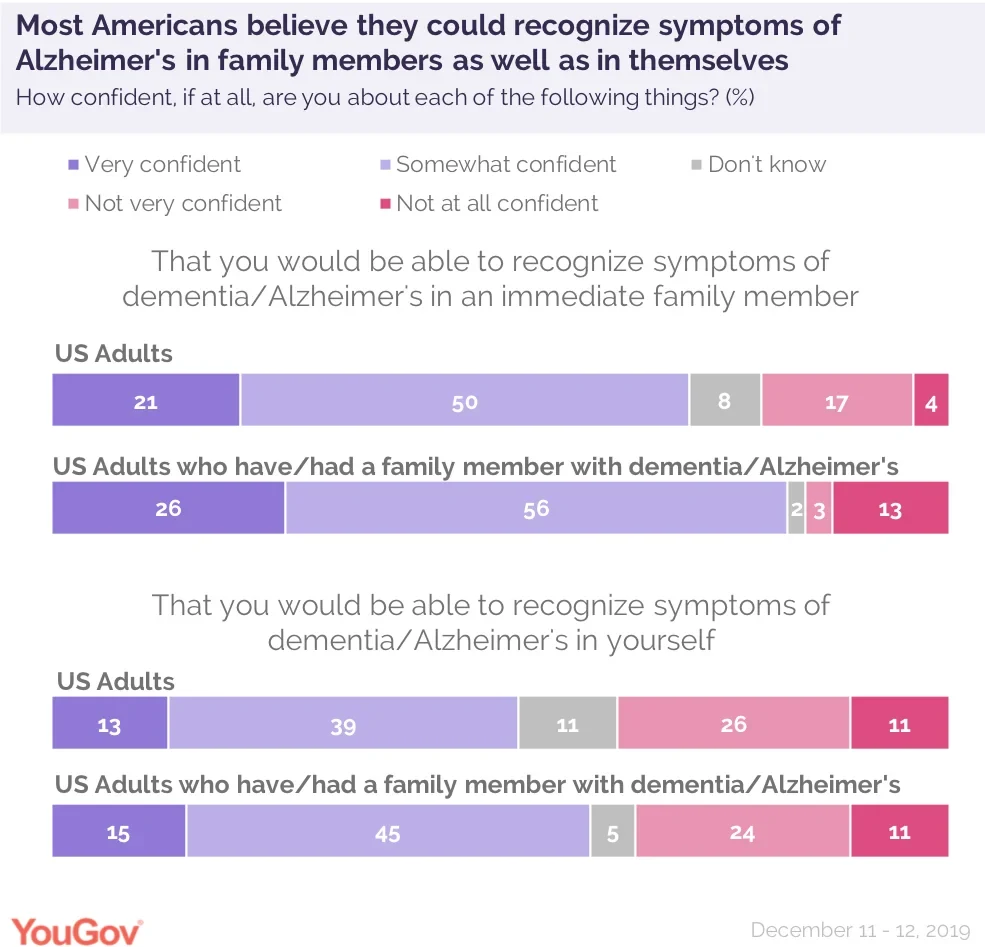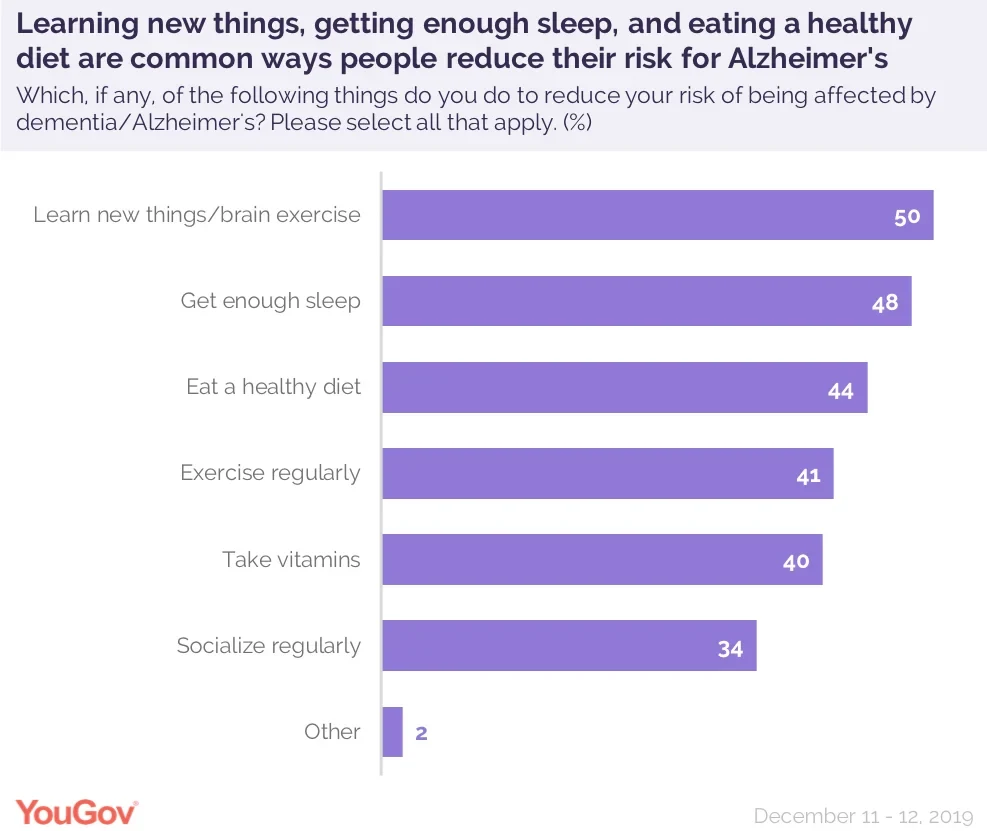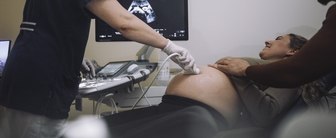Alzheimer’s Disease and dementia have touched many Americans. That includes people who have never personally had degenerative brain disorders but provide caretaker assistance to a family member with dementia.
About three in 10 (31%) Americans say that a member of their family has (or had) dementia/Alzheimer’s. Of that group, 38 percent have performed caretaking responsibilities.
The Alzheimer’s Association notes that many different types of dementia exist, and many conditions cause it, but Alzheimer's disease accounts for a majority of dementia cases. For purposes of this survey, YouGov asked US adults about their experiences with dementia/Alzheimer’s disease.
Women (43%) are more likely than men (32%) to have been caretakers for a family member with dementia. About half (51%) of Baby Boomers who have a relative with dementia say they have been caretakers for a relative experiencing this disorder, while about one-third (34%) of Gen Xers in this group and 26 percent of millennials in this group say the same. Three percent of people say that they themselves have dementia.
Nearly half (49%) of US adults say that they are concerned about developing Alzheimer’s within their lifetime. Those who have had a family member affected by dementia (71%) are particularly likely to say they’re concerned about developing the disease themselves.

According to the Alzheimer’s Association, symptoms of Alzheimer’s can include memory loss, difficulty completing familiar tasks, confusion related to time and places, and new problems with speaking or writing.
Most Americans (52%) believe that they would be able to recognize symptoms of dementia in themselves, while 71 percent believe they would be able to recognize symptoms of dementia or Alzheimer’s in an immediate family member. Those who have a family member with dementia (82%) are particularly likely to say they could spot these symptoms in an immediate family member; 60 percent of this group believes they could recognize symptoms they experienced themselves.

Research published in the Harvard Health Letter suggests that there are certain things people can do to lessen their chances of being affected by Alzheimer’s. Among other suggestions, scientists recommend regular exercise, eating a Mediterranean diet (which tends to include fresh vegetables and fruits; whole grains; olive oil; nuts; legumes and fish), and getting enough sleep.
Other lifestyle choices that may help prevent Alzheimer’s include learning new things and connecting with others socially. Researchers at Harvard note that there is “some—but not enough—evidence” that these activities can reduce the risk of being affected.
YouGov’s research finds that many Americans are doing most of these things already, in hopes of reducing their risk.
When asked which things they do to reduce their risk of being affected by Alzheimer’s, 50 percent say they learn new things/exercise their brains with activities like sudoku or crosswords, while 48 percent say they get enough sleep, 44 percent eat a healthy diet, and 41 percent exercise regularly.

About one in nine (11%) US adults say they don’t do anything specific to reduce the risk of being affected by Alzheimer’s. A similar number (8%) don’t believe that it is even possible for them to reduce their risk of being affected.
Some Americans are hopeful about a cure for Alzheimer’s disease.
One-third (33%) say they are very (9%) or somewhat (24%) confident that a cure for dementia/Alzheimer’s will be discovered within their lifetime. Millennials (36%) and Gen Xers (34%) are slightly more confident about this than Baby Boomers (30%) are.
See the full survey results and sign up to be a part of the YouGov panel.
Related: How old is too old for president?
Methodology: Total unweighted sample size was 1,294 US adults, which included 404 US adults who have at least one family member who had dementia/Alzheimer’s. The figures have been weighted and are representative of all US adults (ages 18+). Interviews were conducted online between December 11 - 12, 2019. To see specific analysis regarding those who have family members affected by dementia, email pr@yougov.com.
Image: Getty












